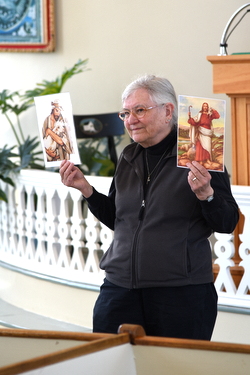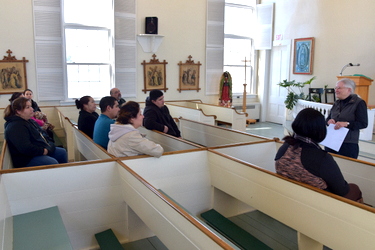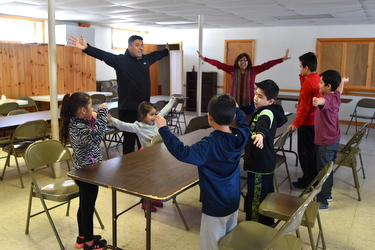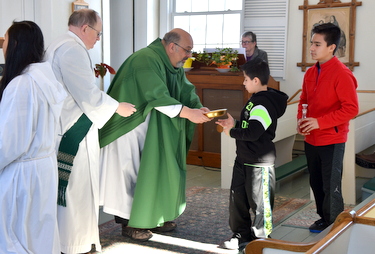A Down East Mission to Teach the Faith

“It’s nice that she can teach us about what is going on, what is happening or what is going to happen, what we need to pray for, who needs our help around the community,” says Juliana Vazquez, who is originally from Mexico.
Because Sister Patricia and other members of the Hispanic Ministry team only make the trip from Portland every four to six weeks, their goal is to reach both children and their parents.
“The parents get the orientation to be able to teach their children, because they’re really the first catechists,” says Sister Patricia.
“I think it’s a beautiful thing for parents to be catechizing their children,” says José. “It’s really good not only for the children but also for the parents because we are reaching parents at the same time.”
“Faith formation begins in the home, and that is what we try to emphasize,” says Rosario.
The area is home to a growing Latino population, some of whom came from countries such as Mexico to work in the blueberry fields and then, finding more permanent employment, decided to remain.

“Because the faith comes from the family, it has to be nurtured in the family, and if they can’t speak the same faith language, that won’t happen,” she says.
Following Mass at Saint Michael, Rosario and José head to the parish hall with the children, while Sister Patricia meets with the parents in the church. Sister gives out handouts and goes over material contained in a parents’ guide, which corresponds to their children’s lessons. On this day, the topics are Lent and reconciliation, since some of the children are preparing to receive the sacrament for the first time.
Before the parents leave, they are given the equivalent of homework. Sister outlines which pages they are to cover and gives them a checklist to make sure no topic is skipped. Although it is a lot of work, Rosario says she can tell that it gets done.

“We talked about God’s ‘Big Ten.’ We went over those,” says Alex Figueroa, age 9.
Alex’s father, Cecilio, who is originally from Mexico, says he is thankful.
“This is something very good that they come to teach us, the parents, because we don’t speak English very well, and it’s important to have the teaching in Spanish because we want to talk to our children,” he says.
“I would like my child to love God, like my parents taught me,” says Maria Ruiz, also originally from Mexico.
In addition to faith formation, other efforts are being made at Saint Michael to serve the Latino community. Father Paul Marquis, pastor of Saint Peter the Fisherman Parish, leads some prayers in Spanish, is working on learning the language, and provided a Lenten book in Spanish.

Without the efforts of the Office of Hispanic Ministry, Father Marquis says the parish would have a difficult time providing faith formation and sacramental preparation for Spanish-speaking families.
“I think it’s vital,” he says.
Members of the office say they do their best to reach Latino families in all corners of the state, but, because they are scattered, it is difficult. Their approach is to connect with one family at a time and hope the word spreads.
“That is one of the big challenges,” says José.
Sister Patricia says you can’t underestimate the importance because the Latino community is growing in Maine, and if the Church doesn’t serve the people, it will lose them.










